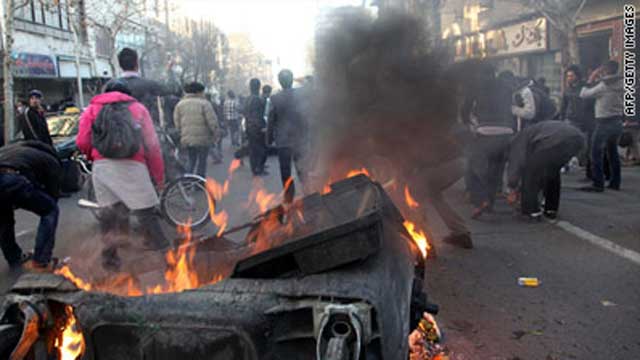Iranian lawmakers condemn protests; call for execution of leaders
February 15, 2011 10:07 a.m. EST

Iranian lawmakers condemn protests
STORY HIGHLIGHTS
- Lawmakers call for the execution of opposition leaders Mehdi Karrubi and Mir Hossein Moussavi
- A European Union official urged Iran to "fully respect" the rights of its citizens
- Protesters were largely cleared from the streets by Monday night
Are you in Iran? Share your stories and photos with CNN iReport, but please make your safety your first priority.
Tehran, Iran (CNN) -- Iranian lawmakers denounced Monday's protests in Tehran and called for the execution of two opposition leaders for inciting the demonstrations, Iran's state-run Press TV reported Tuesday.Members of the Iranian parliament issued fiery chants against opposition leaders and former presidential candidates Mehdi Karrubi and Mir Hossein Moussavi.
Press TV aired video Tuesday of lawmakers chanting "Moussavi, Karrubi ... execute them."
Lawmakers also named former President Mohammad Khatami in some of the death chants.
The calls for the leaders' executions come after a particularly deadly month in Iran. At least 66 people were executed in January, according to Iranian media reports. Most of the executions were reportedly carried out for drug offenses, although at least three involved political prisoners, a U.N. statement said.
U.N. High Commissioner for Human Rights Navi Pillay expressed alarm earlier this month over the number of executions.
 Brutality and hypocrisy in Iran
Brutality and hypocrisy in Iran  Could Iran be the next Egypt?
Could Iran be the next Egypt?  Clinton denounces Iranian 'hypocrisy'
Clinton denounces Iranian 'hypocrisy' RELATED TOPICS
Last week, the Iranian government rounded up activists after Karrubi and Moussavi called for supporters to gather at Azadi Square -- the site of mass protests by Iran's opposition movement after the disputed 2009 presidential elections.
Despite the security crackdown, tens of thousands of demonstrators marched in Tehran Monday.
Patrolling security forces battled protesters with batons and tear gas for much of the day.
The massive crowd was largely cleared from the city's streets by nightfall and the main squares near Tehran University remained free of police, security forces or protesters.
Dozens of demonstrators were detained during Monday's protests, while videos posted on the showed others had been chased and beaten.
One person was shot and killed during the protests, according to Iran's semiofficial Fars news agency. Several others were injured and listed in serious condition as a result of the shooting, which the Iranian government blamed on "agitators and seditionists."
The official Islamic Republic News Agency reported that nine security force members were among those injured in the protests, which the country's deputy police chief called "illegal gatherings ... directed from America, England and Israel."
"The hands of sedition leaders are drenched in blood and they should answer for these actions," Ahmad Reza Radan said, according to IRNA.
Video uploaded to YouTube showed throngs of demonstrators marching, burning posters of Ayatollah Ali Khamenei and in one instance beating a man who appeared to try to remove a poster from the hands of protesters.
Other YouTube video showed police in riot gear pursuing dozens of people running away from the baton-wielding officers.
Other videos show similar protests going on in other cities in Iran such as Shiraz and Isfahan.
CNN cannot independently verify the authenticity of the videos and witnesses declined to be named for fear of retribution.
Reporting from Iran proved extremely difficult Monday -- foreign journalists were denied visas, accredited journalists living in the country were restricted from covering the demonstrations and internet speeds slowed to a crawl in an apparent attempt to both limit protest organizing and restrict information from being transmitted out of the country.
Catherine Ashton, the European Union foreign policy chief, released a statement Tuesday urging Iranian officials to "fully respect and protect the rights of their citizens, including freedom of expression and the right to assemble peacefully."

No comments:
Post a Comment